De Canadese dichter, schrijver en vertaler Jacques Brault werd geboren op 29 maart 1933 in Montreal. Zie ook alle tags voor Jacques Brault op dit blog.
Transparente solitude
Il pleuvait il neigeait comme aujourd’hui
que faisais-je enfant immobile au bord
de la rue je voyageais
J’écoute la pluie s’endormir dans la neige
et les herbes se tapir chez les morts
j’écoute aussi le temps qui me dure
Une insomnie met sa main sur mon front
et soudain couvert de sueur blanche
quelqu’un respire à côté de moi
Ne m’approchez pas je dors et cette mort
glissée entre mes bras ne la fuyez pas
elle dort
Une aube douloureuse chuchote à voix nue
aube grise-glauque comme un corbeau
du froid descendu
Suite fraternelle (fragment)
Je me souviens de toi Gilles mon frère oublié dans la terre de Sicile
je me souviens d’un matin d’été à Montréal je suivais ton cercueil vide
j’avais dix ans je ne savais pas encore.
Ils disent que tu es mort pour l’Honneur ils disent et flattent leur bedaine flasque
ils disent que tu es mort pour la Paix et sucent leur cigare long comme un fusil
Maintenant je sais que tu es mort avec une petite bête froide dans la gorge
avec une sale peur aux tripes
j’entends toujours tes vingt ans qui plient dans les herbes crissantes de juillet
Et nous demeurons pareils à nous-mêmes
rauques comme la rengaine de nos misères
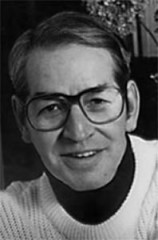
Jacques Brault (Montreal, 29 maart 1933)
Zie voor alle onderstaande schrijvers ook mijn blog van 29 maart 2007 en ook mijn blog van 29 maart 2009 en ook mijn blog van 29 maart 2010.
De Engelse schrijver Maurice Denton Welch werd geboren op 29 maart 1915 in Sjanghai.
Uit: I Left My Grandfather’s House
« I had come to the edge of the moor again, where there were stone walls and green fields. Before nightfall I must find the hostel, somewhere near Gidleigh.
When I did arrive, I found the wooden hut at the back of the farm-house full of small boys. A young master was in charge of them. He came up to speak to me at once, telling me that they had come from a school in the north and that they always went for a jaunt in the summer.
The boys were rushing around, shouting and making such a noise with their feet in the flimsy shed that I could hardly hear what he said.
‘We’ve got to have supper now,’ he yelled; and he went off cheerfully to marshal his boys.
He seemed very strict and full of orders, I thought. The boys were not particularly obedient, and I heard him shout exasperatedly, ‘That’s not playing the game – do it properly – don’t play the goat,’ many times.
The boys were perfectly sure that he would not get too angry. They banged about with enamel plates and mugs; a group of them hung round him continually, waiting for orders, but doing nothing.
At last he had them all sitting at the trestle table with their bread and butter and cocoa before them. He appealed to their better natures, telling them not to be greedy or to eat nastily. All the time he was working very hard; his dark hair began to hang down limply over his white, damp forehedad, and his mouth was continually open.
The boys shouted all their jokes to him, asked him absurd questions, hung on his arms, and passed him food.
After the meal, when they had banged and rattled all their mugs and plates into the sink and wiped them on their dirty towels, they grouped round him in a spreading mass; the whole floor seemed to be covered with boys. An amazing silence reigned. What was going to happen? Were they going to pray?
The young master sat above them on the trestle table, swinging his feet. Several boys climbed up from the floor and clung around him. He shook them off half-heartedly, then decided to take their arms in his and hold them in subdued positions in this way. »
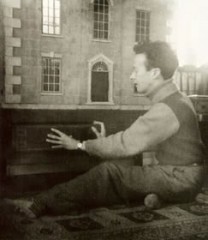
Denton Welch (29 maart 1915 – 30 december 1948)
De Franse schrijver en toneelauteur Marcel Aymé werd geboren op 29 maart 1902 in Joigny.
Uit: Les contes du chat perché
„Delphine et Marinette se couchèrent chacune dans son lit, mais comme il faisait un grand clair de lune qui entrait jusque dans leur chambre, elles ne s’endormirent pas tout de suite.
– Tu ne sais pas ce que je voudrais être ? dit Marinette, qui était un peu plus blonde que sa sœur. Un cheval. Oui, j’aimerais bien être un cheval. J’aurais quatre bons sabots, une crinière, une queue en crin, et je courrais plus fort que personne. Naturellement je serais un cheval blanc.
– Moi, dit Delphine, je n’en demande pas tant. Je me contenterais d’être un âne gris avec une tache blanche sur la tête. J’aurais quatre sabots aussi, j’aurais deux grandes oreilles que je ferais bouger pour m’amuser et surtout j’aurais des yeux doux.
Elles causèrent encore un moment et le sommeil les surprit comme elles exprimaient une dernière fois le désir, Marinette d’être un cheval, Delphine un âne gris avec une tache blanche sur la tête. La lune se coucha environ une heure plus tard. Suivit une nuit noire et épaisse comme jamais pareille. Plusieurs personnes du village dirent qu’elles avaient entendu dans ces ténèbres un bruit de chaînes, en même temps qu’une petite musique de poche et aussi le sifflement de la tempête, quoique le vent ne se fût levé à aucun moment. Le chat de la maison, qui était sans doute averti de bien des choses, passa plusieurs fois sous les fenêtres des petites et les appela du plus fort qu’il put, mais leur sommeil était si profond qu’elles ne l’entendirent pas. Il envoya le chien qui ne réussit pas mieux.“
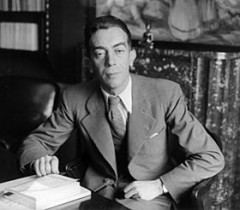
Marcel Aymé (29 maart 1902 – 15 oktober 1967)
De Surinaamse dichter, schrijver en politicus R. Dobru (pseudoniem van Robin Ewald Raveles)werd geboren in Paramaribo op 29 maart 1935.
Uit: A prasi foe Bigi Dorsi / Het erf van Bigi Dorsi
„Ik ben een dezer dagen met een vriend van mij meegegaan naar zijn huis. Hij had een boek van mij geleend en ik moest dat terug hebben. Wel, ik ben erg lang niet één van onze beruchte erven ingegaan en dan ben je geneigd te denken dat die armoede, waar je zelf een kind van bent en zoals je die hebt gekend in je jeugd, niet meer bestaat. Ik kan mij indenken dat de gemeenschap wordt misleid door de mooie voorgebouwen; dat zal echter niet het geval kunnen zijn met de overheid. De overheid heeft namelijk de beschikking over een werkend onderzoeksapparaat en is dus in dagelijks contact met deze erven. Ik stond dus verbaasd over al die onveranderde wantoestanden op het erf. In mijn verbazing kwamen allerlei vragen op, die te maken hebben met opvoeding, hygiëne, sociale rechtvaardigheid, stadsplanning, volkshuisvesting, stadsverfraaiing, enfin een hele moksi boi van problemen en vraagpunten waar ik reeds vele jaren mee worstel. Zoals U het begrepen hebt woont mijn vriend op dit erf in één van de ‘kamers’. Op zo’n erf staan normaliter een flink aantal ‘huizen’. Elke ruimte wordt benut. Er zijn mensen die over meer dan acht vierkante meter moeten kunnen beschikken om de acht tot twaalf kinderen ‘te huisvesten’, maar er zijn er ook bij die tevreden zijn met twee. Voor de laatsten wordt dus ook gezorgd. Stadsverfraaiing of stadsplanning, dus artistieke geweldigheden, tellen helemaal niet daarbij. Wat wel telt is, voor de twee meter vierkant zorgen.
Wel op ons erf stonden vijftien ‘huizen’ en ‘kamers’. Kamers zijn delen van een soort barak welke op zo’n erf gebouwd wordt. Ons erf had twee kamra oso’s. In één van de ‘kamers’ woonde mijn vriend. Voor ik binnen stapte moest ik even aanwijzingen volgen voor het beklimmen van de drempel, want het ‘gebouw’ staat reeds op instorten. Het staat er tenslotte al vijfenzeventig jaar.“
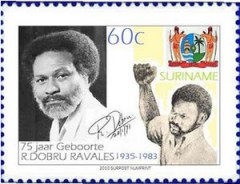
R. Dobru (29 maart 1935 – 17 november 1983)
De Hongaarse schrijver Jenő Rejtő (eig. Reich Lajos) werd geboren op 29 maart 1905 in Boedapest.
Uit: The Embezzled Bank Teller (Vertaald door Enikö Bene)
„To have seen Mr. Curzon having breakfast on the ship (ham and eggs, tea, toast with butter), one would not have been able to tell that this gentleman embezzled twenty thousand dollars the day before. In the calm of spreading the butter on the toast, placing the ham on the top of it, taking a bite from the above and before starting to chew, rinsing with a sip of tea; in this intensified and careful nourishment, there was a typical mosaic of a self confident plutocrat’s comfortable, wise, harmonious lifestyle.
We only emphasize this, otherwise ordinary circumstance, because this was the first time in Mr. Curzon’s life that he ate such an abundant breakfast early in the morning. To date he had gone without the ham and eggs with his tea.
Since he became a clerk ten years ago, he quickly ate his breakfast roll, although with butter but un-toasted, because before leaving for the office, he didn’t have enough time to eat even the simplest breakfast in peace.
Now that he had embezzled, he felt he had the time and the chance to study life with a more peaceful view and, on this criminalistic study tour, the first experiment was the above-mentioned breakfast.
Mr. Curzon, hero of our novel, unfortunately was deprived of all the qualities that are suitable to make a person a hero of the novel. His personality stood in intense contrast with both words. He had very little contact with novels; he didn’t read or write any; big loves always avoided his life; he never dueled; and he never did anything that would give enough material even for a very short story. With regards to being a hero, Mr. Curzon crossed the street when two people argued and, even though he was ashamed to admit, he was afraid of drunks. So, since he was not a novel hero, let’s call him a novel coward.
Our readers will be right if they think: well, how can a person who’s a coward; who’s afraid of any danger or adventure; who’s portrayed in the first couple of lines as a philistine with no imagination; be an embezzler? How can he get to this ship, in this position? With a breakfast!“
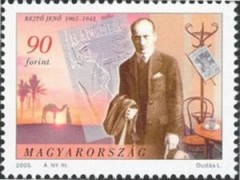
Jenő Rejtő (29 maart 1905 – 1 januari 1943)
De Duitse schrijver Johann Karl August Musäus werd geboren op 29 maart 1735 in Jena.
Uit: Vierte Legende von Rübezahl
„Eines Tages sonnte sich der Geist an der Hecke seines Gartens, da kam ein Weiblein ihres Weges daher in großer Unbefangenheit, die durch ihren sonderbaren Aufzug seine Aufmerksamkeit auf sich zog. Sie hatte ein Kind an der Brust liegen, eins trug sie auf dem Rücken, eins leitete sie an der Hand, und ein etwas größerer Knabe trug einen ledigen Korb nebst einem Rechen, denn sie wollte eine Last Laub fürs Vieh laden. Eine Mutter dachte Rübezahl ist doch wahrlich ein gutes Geschöpf, schleppt sich mit vier Kindern, und wartet dabei ihres Berufs ohne Murren, wird sich noch mit der Bürde des Korbes belasten müssen: das heißt die Freuden der Liebe teuer bezahlen!
Diese Betrachtung versetzte ihn in eine gutmütige Stimmung, die ihn geneigt machte, sich mit der Frau in Unterredung einzulassen. Sie setzte ihre Kinder auf den Rasen, streifte Laub von den Büschen, indes wurde den Kleinen die Zeit lang und sie fingen an heftig zu schreien. Alsbald verließ die Mutter ihr Geschäfte, spielte und tändelte mit den Kindern, nahm sie auf, hüpfte mit ihnen singend und scherzend herum, wiegte sie in Schlaf, und ging wieder an ihre Arbeit. Bald darauf stachen die Mücken die kleinen Schläfer, sie fingen ihre Symphonien vom neuen an: die Mutter wurde darüber nicht ungeduldig, sie lief ins Holz, pflückte Erdbeere und Himbeere, und legte das kleinste Kind an die Brust. Diese mütterliche Behandlung gefiel dem Gnomen ungemein wohl.“
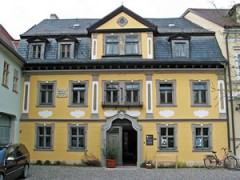
Johann Musäus (29 maart 1735 – 28 oktober 1787)
Musäushaus (voormalige woonhuis) in Weimar
